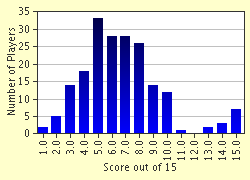Quiz Answer Key and Fun Facts
1. What is meant by "appeasement" in a post 1940 political context?
2. In October 1919, a book was published in Britain expressing grave misgivings about the peace treaties and arguing that they were harmful to the international order and likely to keep resentment alive in Germany and Austria. Who was the author?
3. In the period from 1924 onwards some concessions were made to the Weimar Republic. Which of these was NOT on the agenda at the time?
4. Hitler became German Chancellor on 30 January 1933. What was the political complexion of the British government at the time?
5. In 1933, which of these was the most salient, official feature of Britain's official policy towards Continental Europe?
6. One junior member of the British government spoke out publicly in forthright and wide-ranging terms against Nazi Germany in September 1933. Who was it?
7. When did the RAF start to rearm on a significant scale?
8. In what year did the large-scale rearmament of the Royal Navy start?
9. Which of these best characterizes the official policy of the Labour Party towards Nazi Germany from 1935-39?
10. One of these is generally held to embody appeasement as none other. Which?
11. On what grounds did the British government justify appeasement? What did Chamberlain, Halifax and others say that they were doing?
12. The former Labour leader, George Lansbury, wrote of Hitler as follows in 1937: "Most fanatics are sincere, but they make lots of trouble. Even so, a soft word, a tiny recognition of Hitler's position by diplomats, would make all the difference. He is a very lonely man ... He will *not* go to war unless pushed into it by others."
13. After the Munich Agreement, (Alfred) Duff Cooper resigned from the government. What did he give as the *main* reason for doing so, in his resignation speech to the House of Commons?
14. In March 1939, Germany invaded the "rump" of Bohemia and Moravia. Chamberlain responded by giving a guarantee to Poland that Britain would support the country if its independence was threatened by force. What criticism was made of this guarantee in Britain at the time?
15. On 1 September 1939, Germany unleashed its invasion of Poland and two days later Britain declared war on Germany. Chamberlain addressed the nation on radio. Did he talk about winning the war?
Source: Author
bloomsby
This quiz was reviewed by FunTrivia editor
Exit10 before going online.
Any errors found in FunTrivia content are routinely corrected through our feedback system.

